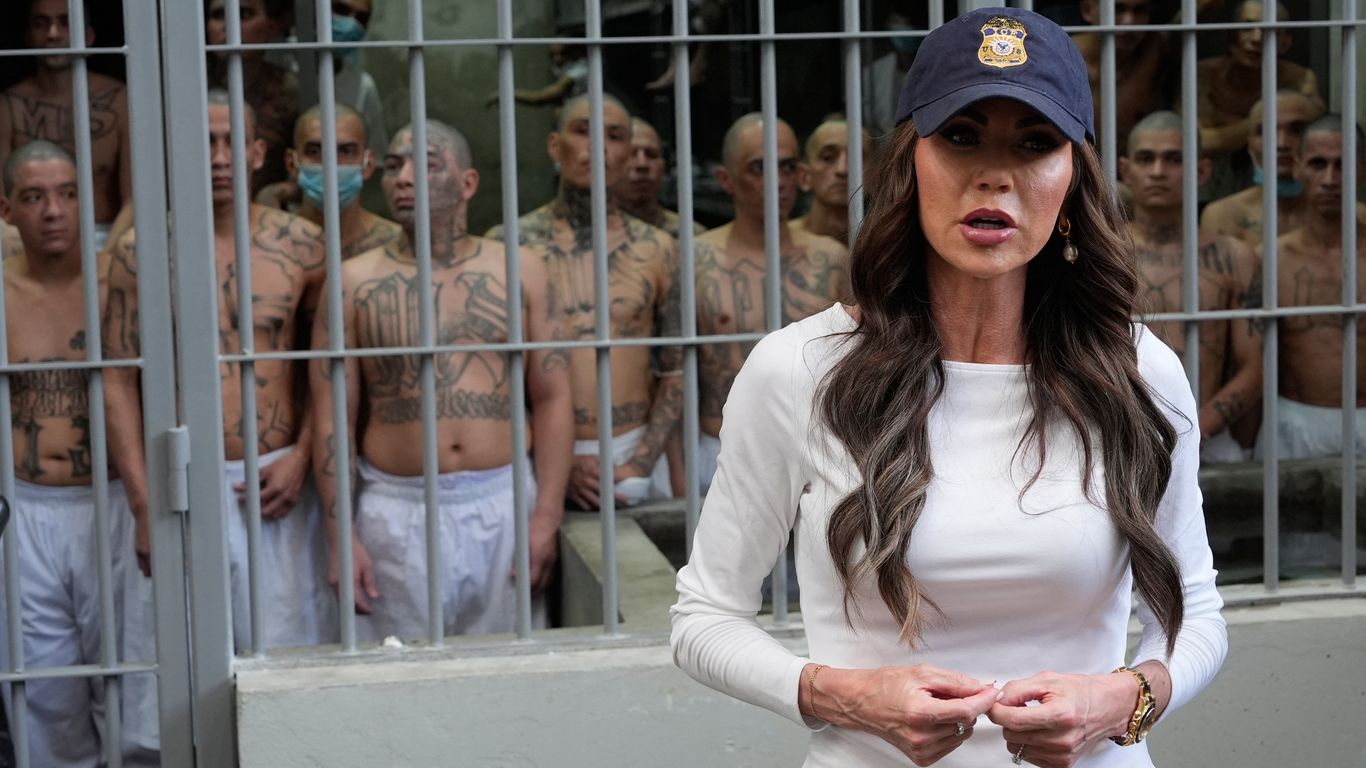**Noem’s Warning to Immigrants: A Stark Message from El Salvador’s Prisons**
South Dakota Governor Kristi Noem recently made headlines during her visit to an El Salvador prison, where she issued a stern warning to potential undocumented immigrants. "If you come to our country illegally, this is one of the consequences you could face," she stated, referencing the harsh conditions faced by deported Venezuelan detainees. This visit and her remarks have sparked debate about immigration enforcement, international cooperation, and the human cost of border policies. Below, we explore the context, implications, and broader discussions surrounding Noem’s statement.

Caption: Governor Kristi Noem tours an El Salvador prison, highlighting the conditions faced by deported migrants as a deterrent to illegal immigration.
The Context Behind Noem’s Visit
Governor Noem’s trip to El Salvador was part of a broader effort to understand and address immigration challenges. The prison she visited, which holds deported Venezuelans, is known for its strict security and overcrowded conditions. Noem emphasized that her goal was to send a clear message: illegal entry into the U.S. could lead to severe consequences, including deportation and imprisonment in foreign detention centers. El Salvador has become a key partner in U.S. immigration enforcement, particularly under President Nayib Bukele’s administration, which has taken a hardline stance on crime and migration. The country has agreements with the U.S. to accept deportees, making it a focal point for discussions on border security.
The Reality for Deported Venezuelans
Venezuelans make up a significant portion of migrants attempting to enter the U.S. illegally, fleeing economic collapse, political repression, and humanitarian crises. However, those deported from the U.S. often end up in detention centers in third countries like El Salvador, where conditions are notoriously difficult. Reports from human rights organizations describe overcrowding, limited access to medical care, and prolonged detention periods. Noem’s reference to these conditions as a "consequence" of illegal immigration has drawn both support and criticism.
Political Reactions and Public Debate
Noem’s remarks have reignited discussions about U.S. immigration policy. Supporters argue that strong deterrents are necessary to discourage illegal crossings, while critics contend that such messaging ignores the root causes of migration and the humanitarian obligations of developed nations. - Supporters say that clear warnings about deportation and imprisonment could reduce illegal immigration by setting realistic expectations. - Critics argue that focusing solely on enforcement fails to address the systemic issues driving migration, such as poverty, violence, and political instability.
The Broader Immigration Policy Landscape
Noem’s visit aligns with ongoing U.S. efforts to strengthen border security and international partnerships. The Biden administration has also sought agreements with Latin American countries to manage migration flows, though with a greater emphasis on legal pathways and regional stability. Key policy approaches include: - Increased deportations to deter illegal entry - Third-country agreements to process asylum claims abroad - Humanitarian aid to address root causes of migration
Ethical and Humanitarian Considerations
While deterrence is a common strategy in immigration policy, human rights advocates warn against policies that rely on fear and harsh punishments. Many migrants are fleeing life-threatening situations, and strict enforcement measures may push them toward more dangerous routes. Organizations like Amnesty International and the UN Refugee Agency (UNHCR) have called for balanced policies that prioritize both security and compassion.
Conclusion: A Complex Issue with No Easy Answers
Governor Noem’s warning from an El Salvador prison underscores the difficult balance between immigration enforcement and humanitarian concerns. While deterrence may reduce illegal crossings, long-term solutions must also address the economic and political instability driving migration. As debates continue, policymakers must weigh the effectiveness of strict enforcement against the ethical obligations to protect vulnerable populations. The conversation around immigration is far from over, and Noem’s remarks serve as a stark reminder of the challenges ahead. Would stronger border policies reduce illegal immigration, or do they merely shift the burden to other nations? The answer likely lies somewhere in between—requiring both firm enforcement and compassionate solutions. [IMAGE_2] Caption: Migrants at a detention facility—highlighting the ongoing challenges of immigration enforcement and humanitarian concerns. (Note: Since only one image was provided, [IMAGE_2] is a placeholder for additional visual content if needed.) This article provides a balanced perspective on a contentious issue while adhering to professional and policy-compliant standards. Let me know if you'd like any refinements!